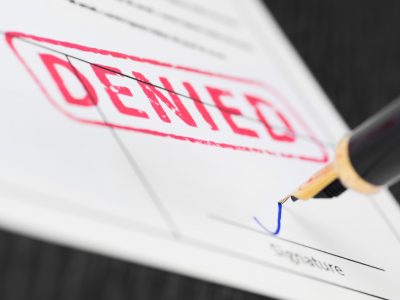
Insurance is an important safety net that you almost always need. Sometimes you don’t have a choice. Almost universally auto insurance is mandatory, so is homeowners insurance when you have a mortgage. In your time of need, you expect your insurance company to pay you if you suffer a covered loss.
But at times your insurance company sometimes doesn’t pay for reasons that are not right. We’ve created a short guide with details on the steps you can take.
Let us explore all you need to know about how to deal with a denied insurance claim.
Why Do Insurance Companies Deny Claims?
Unfortunately, there’s a handful of reasons why an insurance company could deny a particular claim. It’s important to understand these situations so that you can take the appropriate action.
Let’s explore the most notable.
Failure to Notify
It should come as no surprise that failure to timely notify your insurance company may lead to a denied claim. For example, let’s assume a lighting strike burns your house to the round. You need to notify your insurance company so it may send an investigator to examine the scene. It’s in your best interest to get in touch with your insurance provider as soon as possible. The insurance company has an absolute right to inspect. There is no reason to interfere or delay the insurance company from inspecting.
Misrepresentation on Your Application.
Insurance companies must know the risk that the company is underwriting. If you tell the insurance company you don’t smoke on a life insurance company application, that statement has to be true. Because if you are a user of smoker, the insurance company would charge you a higher premium, or might even deny coverage. If you don’t tell the truth about a material fact on your insurance application, the insurance company has a lawful right to deny coverage. This varies depending on the state. But honesty is the best policy.
Claim Errors
You fail to cooperate with the insurance company. You need to assist the insurance company in processing your claim. You need to provide the information requested. Inadequate information can lead to a claim denial. Your failure to provide information is the easiest problem to fix and to get paid.
Bad-Faith Declination
Although not common this happens. A bad-faith declination refers to when an insurance provider willingly declines a claim for bad reasons. Often this is a financially motivated decision. In all states an insurance company owes to the insured a duty of good faith and fair dealing.This is a promise the law implies into every contract that the parties will act in good faith to fulfill the contract. Insurance is treated specially. For example, The California Supreme Court has explained that, when a person buys an insurance policy, they do “not seek to obtain a commercial advantage” but only “protection against calamity.”Egan v. Mutual of Omaha Ins. Co. 24 Cal. 3d 809, 818 (1979). The duty of good faith and fair dealing is “is unconditional and independent” of any obligations owed by the policyholder. Gruenberg v. Aetna Insurance Company, 9 Cal.3d 556, 578 (1973).
How Do I Handle This Situation?
Fortunately, there are steps that you can take even after your claim has been denied. But it’s important that you act quickly. Let’s dive in.
Assess the Facts
Look at your claim objectively. Get someone else to examine the facts to determine whether the insurance company denied your claim incorrectly. So, you will need to step back and look at the situation you’re in. If you still conclude that your claim should not have been denied, you need to act.
Be Polite to the Insurance Company
Dealing with a denied claim can easily become overly frustrating. In fact, it is not uncommon for those dealing with this situation to lash out at their insurance company. Since this person serves as a valuable resource in helping you resolve this issue, it’s essential that you treat them fairly. The front-line claims people are most often just messengers. If there is something awry, it’s coming from above. Don’t lash-out at the person you deal with the most.
Gather as Much Evidence as Possible
If your claim is denied, it becomes your responsibility to prove that your claim should have been satisfied. You need to gather as much evidence as possible.This will vary depending on what type of insurance you are dealing with. A general rule of thumb is that you should collect as much documentation as you can to support your assertion. Documents consist of more than just paper. Photos, videos, and other forms of documenting facts often are helpful.
Get in Touch with a Legal Professional
Seek assistance early from a professional who deals with insurance claims. For property damage losses, such as a house fire, often a public adjuster is an excellent choice. For other types of insurance, such as health, life, or disability, finding an attorney who specializes in this area is your best choice.
Handling a Denied Insurance Claim Can Be Complicated
Want to learn more about how we help? Feel free to reach out to us today at (866) 816-3171 or connect with us online for a complimentary review of your claim. We’ll provide you with important next steps to help you win your disability benefits.
For more than 25 years, Jonathan M. Feigenbaum has been representing just like you in claims and litigation against insurance companies.

